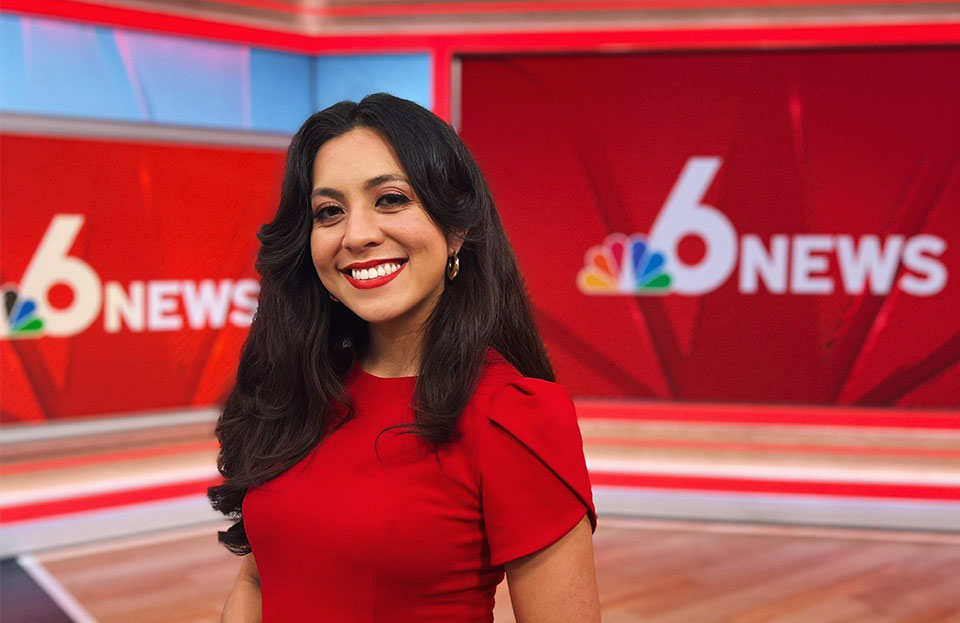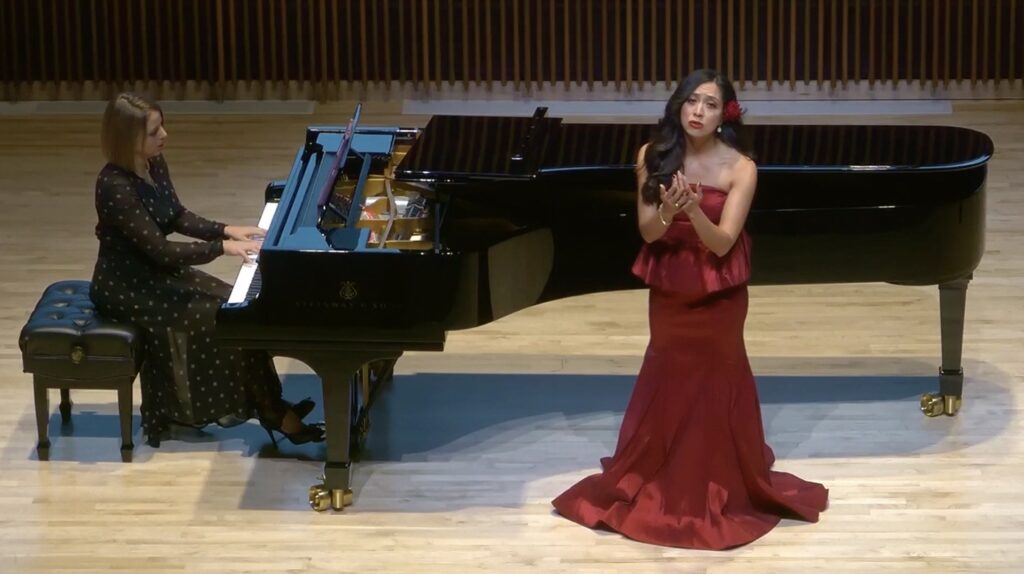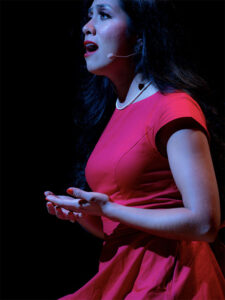
‘Singers are Journalists Too’ – Chicana Alum Spotlights Nahuatl Heritage Through Opera
Xóchitl Hernández ’20 (Vocal Arts), a dynamic storyteller and CSUN legacy, is breaking new ground in the opera world by incorporating the indigenous Nahuatl language into her performances.
After learning to embrace her identity as a Mexican American musician and journalist under the guidance of professors such as Fermin Herrera, David Sannerud, Jose Luis Benavides and Ben Davis, she aspires to bring more diverse storytelling to the typically Eurocentric classical and opera worlds with the Uto-Aztecan indigenous language, Nahuatl — inspired by her Chicana roots.

“It’s really important to me to bring indigenous music to the forefront of classical music,” she said. “People of all races and backgrounds need to feel welcome and that they have a place at the table.”
At CSUN, she learned the basics of Nahuatl from longtime Chicana/o studies professor Fermin Herrera. For Hernández, it wasn’t just about picking up a new language — it was about connecting with her heritage and dreaming about how she could bring this beautiful, ancient language into her music.
Combining her culture and love for music, she decided to take Herrera’s class on Regional Mexican Music.
Xochitl Hernandez sings as a blue light illuminates on her in a red dress.
Xochitl Hernandez sings beautifully in her native language, inspired by her Chicana heritage.
“[The class] made me feel so proud to be Mexican and a musician,” she said.
Her first time performing in Nahuatl was at her master’s recital at the University of Miami in March, and it was an epiphany — inspiring her to do more to diversify classical music.

Trio of Mentors
Her first voice teacher in classical singing, Dr. Sannerud, whom she called one of her greatest mentors, bolstered her confidence to turn her talent into a career. “He changed my life,” she said of Dr. Sannerud. “I didn’t know if there was a place for me in classical music and opera.”
After Hernández added a minor in Spanish-language journalism, Dr. Benavides became another mentor. He introduced her to Davis, who ran the Department of Journalism’s Valley View News show. Although at first, she knew little about broadcast journalism, the three professors helped her bridge two key aspects of her identity.
“Singers are journalists too,” Davis said. He told her that singers, like journalists, are storytellers — which is exactly how she saw herself. A career in broadcast seemed like the perfect fit, she said.
Journalism and Blending Passions
She graduated from CSUN in May 2020, as the COVID-19 pandemic raged and just as the Black Lives Matter movement would sweep the nation after the murder of George Floyd. Hernández started working as a bilingual reporter for Washington state’s Tri-Cities KNDU station.
She loved having the opportunity and trust to share people’s stories in their best and worst times, she said, which she continued to do even after she left KNDU.
In 2022, Hernández took another step toward elevating her opera career, enrolling in the Master of Music in Vocal Performance program at the University of Miami. While furthering her classical training, she got the opportunity to continue as a part-time news reporter for NBC 6 South Florida.
This past May, she completed her master’s at Miami and wrapped up her time at NBC. Her next stop? The Rocky Mountains, where she was accepted to the Central City Opera in Central City, Colorado, just west of Denver, where she’s performing as a contracted studio artist for the summer festival, through August. She will continue to apply for young artist programs to receive a two to three year residency.
In Colorado, she plans to continue building a space for her Chicana culture in classical music.
Family Roots
Hernández has been surrounded by music her whole life — her father plays the guitar in a mariachi band and her mother sings.
The singer and journalist is a third-generation Matador. Her parents’, Leo Hernandez ’97 and Isabel Xochitl Vazquez ’97, M.A ’12, were getting their teaching credentials from CSUN while Hernández was a little girl, riding her bicycle around campus. Both work as teachers for LAUSD. Her grandfather, Armando Vazquez, began attending what was then San Fernando Valley State College (now CSUN) in 1969, where he helped spearhead the Department of Mexican American Studies, now known as Chicana/o Studies. She credited her connection and appreciation of her culture to her family.
On May 18, after receiving her master’s, she returned to CSUN, where she gave a powerful performance at the Shigemi Matsumoto Recital Hall. She sang four Nahuatl songs, all by Mexican composer Salvador Moreno. Returning to her hometown and singing in her native language, celebrating Aztec culture, was a full-circle moment for Hernández, she said.
Looking Forward
After her summer of opera, Hernández said, she plans to audition for every performance she comes across — whether they’re gigs or opportunities through young artist programs. She also plans to continue her journalism career in some capacity. Her dream has been to work in both professions at the same time, and she will not give up on that, she said.
As she reminisced on her time as a Matador, Hernández remained grateful for everything she learned at CSUN, the campus where she discovered it was possible to embrace her two-part identity and make her dreams come true.
“A lot of people dream small because they feel like they don’t have the resources to do what they want,” she said, “but all you need is the courage and strength to go for it.”